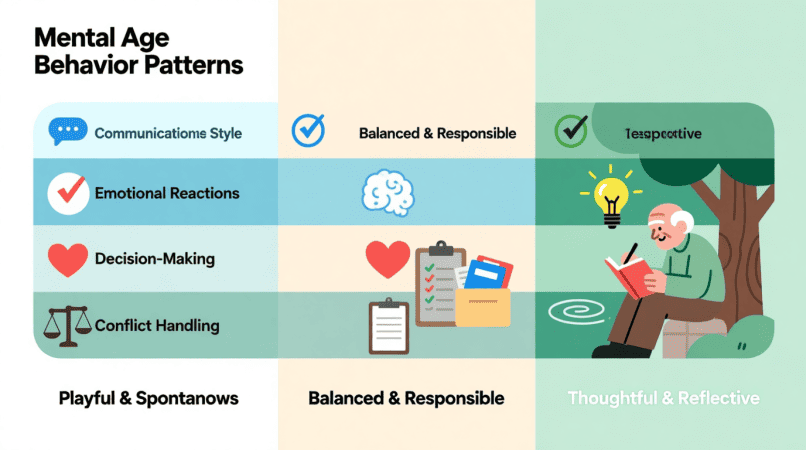
Your mental age doesn’t always match your real age. Some people feel and act younger than the years on their ID, while others seem more mature and thoughtful than their peers. Acting according to your mental age is about recognizing your mindset and learning how to live in a way that balances your personality with life’s expectations.
Take our mental age test free to discover how your behavior aligns with your real mental age.
Acting according to your mental age means aligning your behavior with your maturity level:
- A younger mental age acts with curiosity and spontaneity.
- A balanced mental age blends fun with responsibility.
- An older mental age favors caution, stability, and reflection.
Acting With a Younger Mental Age
Traits: Playful, adventurous, impulsive, emotionally expressive.
How to act:
- Channel energy into hobbies, creativity, or travel.
- Stay open to fun but add guardrails for finances and commitments.
- Surround yourself with friends who balance your spontaneity with grounding influence.
Example: A 28-year-old with the mental age of 20 might thrive in start-ups, artistic projects, or adventurous goals—but benefits from budgeting and steady habits.
Understand how our mental age test works to better interpret your actions and mindset.
Acting With a Balanced Mental Age
Traits: Adaptable, practical, flexible, steady.
How to act:
- Keep routines but allow for unplanned experiences.
- Balance career focus with relaxation and social life.
- Use both logical and emotional thinking when making choices.
Example: A 35-year-old with a mental age of 35 may plan ahead for retirement but still enjoy spontaneous weekend trips.
Read more about how does mental age affect personality to see how thought patterns connect to behavior.
Acting With an Older Mental Age
Traits: Wise, reflective, cautious, emotionally controlled.
How to act:
- Use maturity for mentoring, leadership, or decision-making roles.
- Avoid letting caution stop you from enjoying play or new experiences.
- Add lighter activities—music, games, social events—to keep balance.
Example: A 25-year-old with a mental age of 40 may excel in responsibility but needs to protect space for fun and rest.
Why Acting According to Mental Age Matters
- Self-awareness: You understand why you act differently from your peers.
- Better decisions: Matching your mindset helps you play to your strengths.
- Relationship health: Knowing your mental age explains differences in maturity levels between friends or partners.
Curious where you stand? Try the Mental Age Calculator and see how your mental age compares with your real one.
Reflection Prompts
- Do I usually act younger, older, or in sync with my age?
- When does my mental age help me? When does it hold me back?
- What balance of fun and responsibility feels right for me?
Explore how your mental age vs real age balance influences the way you process information.
FAQs
1. Should I always act according to my mental age?
Not always—sometimes it’s better to adjust based on context (e.g., workplace vs. social setting).
2. Can mental age change how I behave?
Yes. Experiences, growth, and challenges often shift your mental age and the way you act.
3. Is it bad if my mental age feels younger than my real age?
No. It often means you’re playful, creative, or open-minded. Just balance it with responsibility.
4. What if my mental age feels older than my chronological age?
That can mean you’re responsible and wise early on. Just be careful not to miss out on joy and exploration.
Final Thoughts
How you act depends less on the number of birthdays you’ve had and more on how you see the world. Whether your mental age is younger, older, or in sync with your real age, the key is balance—using your strengths while making space for what’s missing.
- Your daily choices are heavily influenced by the connection between mental age and decision making.
- It is interesting to observe the behavioral gap in mental age vs real age scenarios.
- You can use specific observations to calculate the mental age of a person based on their actions.
- Many people ask themselves what is my mental age when they notice they act differently from their peers.
- You should look for the specific signs of emotional and mental maturity in your routine interactions.
- Learning how to interpret test results can shed light on your specific behavioral patterns.
- Your conduct might suggest that your mental age is higher than your actual chronological years.